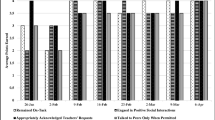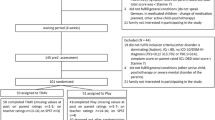Abstract
The present study compared the effects of a cognitive-behavioral therapy with those of a supportive/psychodynamic therapy in a psychiatric dayhospital for the treatment of conduct-disordered youth (mean age 10 years 8 months). Subjects were diagnosed conduct-disordered and randomly assigned to one of two orders of the two individual treatment conditions in a crossover design. Dependent measures included indices of psychopathology as well as measures of prosocial behavior and were gathered from multiple sources. The cognitive-behavioral treatment led to significant improvements on teacher's blind ratings of classroom behavior (e.g., Self-Control Rating Scale) indicating a reduction in impulsivity, as well as on measures inidcating increases in appropriate behavior and adaptive functioning (e.g., Child Behavior Checklist). Both treatments produced some significant gains (teacher ratings of externalizing problems using the Child Behavior Checklist, and hyperactivity using the Conners Teacher Questionnaire), and some dependent measures did not evidence therapeutic change. Some of the cognitive-behavioral program's positive effects were more pronounced after its second administration. Normative comparisons, used to attempt to address clinical significance, were conducted and reported. The implications of the findings and the need for future research are discussed.
Similar content being viewed by others
References
Achenbach, T. M., & Edelbrock, C. S. (1983).Manual for the Child Behavior Checklist and Revised Child Behavior Profile Burlington, VT: University Associates in Psychiatry.
Braswell, L., & Kendall, P. C. (1987). Treating impulsive children via cognitive-behavior therapy. In N. S. Jacobson (Ed.),Psychotherapists in clinical practice (pp. 153–189). New York: Guilford.
Camp, B. W., Blom, G. E., Herbert, F., & Van Doorninck, W. J. (1977). “Think Aloud”: A program for developing self-control in young aggressive boys.Journal of Abnormal Child Psychology, 5 157–169.
Conners, C. K. (1969). A teacher rating scale for use in drug studies with children.American Journal of Psychiatry, 126 884–888.
Harter, S. (1985).Manual for the Self-Conception Profile for Children. Denver. University of Denver.
Herjanic, B., & Reich, W. (1982). Development of a structural psychiatric interview for children: Agreement between child and parent on individual symptoms.Journal of Abnormal Child Psychology, 10 307–324.
Hinshaw, S. P., Henker, B., & Whalen, C. D. (1984). Self-control in hyperactive boys in angerinducing situations: Effects of cognitive-behavior training and methylphenidate.Journal of Abnormal Child Psychology, 12 55–77.
Kagan, J. (1966). Reflection-impulsivity: The generality and dynamics of conceptual tempo.Journal of Abnormal Psychology, 71 17–24.
Kazdin, A. E. (1987).Conduct disorder in childhood and adolescence. Beverly Hills, CA: Sage.
Kazdin, A. E., Esveldt-Dawson, K., French, N. H., & Unis, A. S. (1987). Problem-solving skills training and relationship therapy in the treatment of antisocial child behavior.Journal of Consulting and Clinical Psychology, 55 76–85.
Kendall, P. C. (1987, August).Active ingredients in psychotherapy. Presidential address (Division 12, Section III) to the American Psychological Association Convention, New York.
Kendall, P. C. (1989).Stop and Think Workbook. Available from the author, 238 Meeting House Lane, Merian, PA 19066.
Kendall, P. C., & Braswell, L. (1982). On cognitive-behavioral assessment: Model, method, and madness. In C. D. Spielberger & J. N. Butcher (Eds.),Advances in personality assessment (Vol. 1, pp. 35–82). Hillsdale, NJ: Erlbaum.
Kendall, P. C., & Braswell, L. (1985).Cognitive-behavioral therapy for impulsive children. New York: Guilford.
Kendall, P. C., & Grove, W. (1988). Normative comparisons in therapy outcome.Behavioral Assessment, 10 147–158.
Kendall, P. C., & Norton-Ford, J. D. (1982). Therapy outcome research methods. In P. C. Kendall & J. N. Butcher (Eds.),Handbook of research methods in clinical psychology (pp. 429–460). New York: Wiley.
Kendall, P. C., & Wilcox, L. E. (1979). Self-control in children: The development of a rating scale.Journal of Consulting and Clinical Psychology, 47 1020–1030.
Kendall, P. C., & Wilcox, L. E. (1980). Cognitive-behavioral treatment for impulsivity: Concrete conceptual training in non-self-controlled problem children.Journal of Consulting and Clinical Psychology, 48 80–91.
Kendall, P. C., & Zupan, B. (1981). Individual versus group application of cognitive-behavior self-control procedures with children.Behavior Therapy, 12 344–359.
Meyers, A. W., & Craighead, W. E. (Eds.). (1984).Cognitive behavior therapy with children. New York: Plenum.
Robins, L. (1966).Deviant children grown-up. Baltimore: Williams & Wilkins.
Rosnow, R. R., & Rosenthal, R. (1988). Focused tests of significance and effect size estimation in counseling psychology.Journal of Counseling Psychology, 35 101–106.
Spivack, G., Platt, J., & Shure, M. B. (1976).The problem solving approach to adjustment. San Francisco: Jossey-Bass.
Urbain, E. S., & Kendall, P. C. (1980). Review of social cognitive problem-solving interventions with children.Psychological Bulletin, 88 109–143.
Author information
Authors and Affiliations
Additional information
The authors wish to thank Kathy Comly, Diane Datcher, Judy Ebby, Geetha Kumar, Kathy Schramm, and Ben Vitiello, and to acknowledge the excellent comments of two anonymous reviewers.
Rights and permissions
About this article
Cite this article
Kendall, P.C., Reber, M., McLeer, S. et al. Cognitive-behavioral treatment of conduct-disordered children. Cogn Ther Res 14, 279–297 (1990). https://doi.org/10.1007/BF01183997
Issue Date:
DOI: https://doi.org/10.1007/BF01183997




